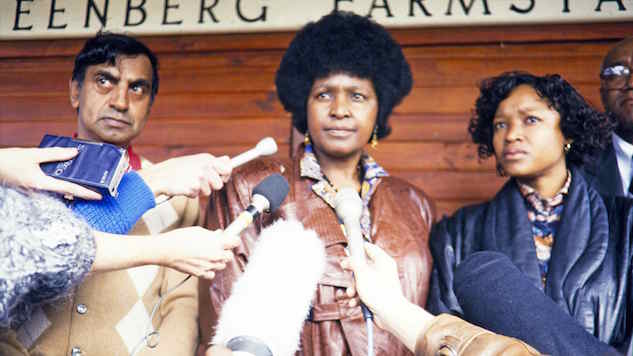Winnie Is a Frank, Intimate Portrait of a Firebrand
Photo: Courtesy of Adil Bradlow/Africa Media Online
You know the saying: Behind every great man, etc. Well, behind Nelson Mandela, there was his often-overshadowed and possibly quite misunderstood wife, Winnie. In honor of Black History Month, Independent Lens is offering a more intimate and personal look at the other face of the African National Congress.
Winnie Madikizela-Mandela was a firebrand—still is. As one of the documentary’s primary interview subjects, she retains a commanding and powerful charisma, which director Pascale Lamche uses to very affecting advantage in a series of recollections and comments about coming of age under the brutalities of apartheid and the ceaseless agitation to see the system break in her lifetime. The government labeled her a Communist and “dangerous,” and if you were a pro-apartheid white South African, I suppose “dangerous” isn’t an incorrect word for what she was: intelligent, impassioned and risk-taking, she was a flawed human being with tremendous vision who has, until now, not really received her due as a contributor to the struggle for a freer South Africa.
Nelson Mandela was imprisoned for 27 years (“Actually, I was relieved,” Winnie comments. “It could have been much worse. By jailing the men, they kept them safe.”). During that time it was Winnie who was the on-the-ground face of the ANC, flouting both racial and gender hierarchies, declining the relative safety of exile abroad, and becoming symbolic of the oppression of her people.
Winnie Mandela was, to coin a phrase, a shit-disturber. The government targeted her with smear campaigns and sent spies to infiltrate her organization. (Her own recollections of this, as well as those of her daughter Zindzi, are quite moving.) It ultimately managed to cast Winnie as a “fallen woman” (why does that stereotype still work so well? I mean, seriously), and, as it became increasingly inevitable that the government would have to release her husband, they took advantage of an opportunity to divide the two even further, discrediting Winnie in the process. “They tried to pitch my parents like the Saint and the Sinner,” their daughter Zindzi recounts, “and you’re thinking: ‘What even gives you the right?’”
The Mandela’s marriage didn’t survive; that’s well known. We’ve been taught less about what happened after that, and this film follows a rather amazing mosaic of political intrigue, character assassination and reversals of fortune that we haven’t necessarily gotten the chance to see before. Through Winnie and Zadzi’s own reflections as well as rare archival footage, we see another face of Winnie Mandela, and it’s one that deserves to be seen.
Winnie Mandela was a controversial figure for most of her life, and like most leaders, imperfect. But she spent three decades of relentless agitation for a democratic South Africa; she was the face of the movement while Nelson Mandela was behind bars, and her contribution to that effort should be recognized and studied just as her ex-husband’s was.
This documentary is frank, personal, and totally unapologetic. We have an unfortunate tendency to minimize women’s contributions to history and particularly to change—this must be rethought and fought against. It’s arguably not possible to fully understand the South African journey toward democracy without understanding Winnie Mandela. This is a great place to start.
Winnie premieres on Independent Lens, tonight at 10 p.m. on PBS. Check your local listings.
Amy Glynn is a poet, essayist and fiction writer who really likes that you can multi-task by reviewing television and glasses of Cabernet simultaneously. She lives in the San Francisco Bay Area.